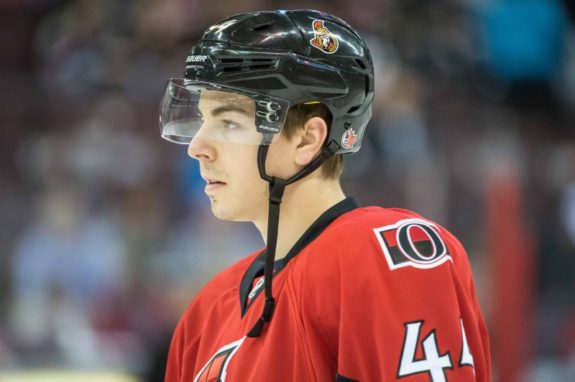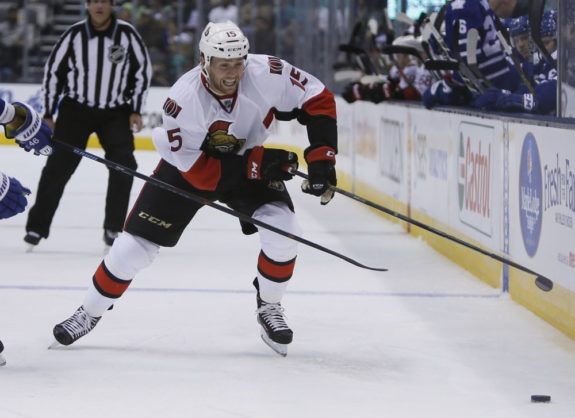Prior to last season’s trade deadline, Ottawa Senators general manager Pierre Dorion made an effort to shore up the team’s forward group for the remainder of the season. The Sens added veteran forwards Tommy Wingels, Alex Burrows and Viktor Stalberg, players who helped give the team some depth in the playoffs.
Heading into the second half of the 2017-18 season, Dorion is in a very different situation, where it is in the best interest of his team to offload some of his forward depth instead of adding to it. With the Senators facing a very tough climb to get back into playoff contention, teams have been calling Dorion looking to capitalize on Ottawa’s disappointing season. Teams like the St. Louis Blues have reportedly been calling about Mike Hoffman but there has also been interest in several players in the Senators’ bottom-six.
Zack Smith, Jean-Gabriel Pageau and Alex Burrows are some of the other forwards that have generated interest from other teams and while there have been calls about Derick Brassard, the Sens aren’t looking to trade one of their top two centres. Dorion is listening to offers but doesn’t seem interested in blowing up his team.
Scoring Depth a Deep Problem
The Senators have two strong lines at the top of their depth chart but when one of the Matt Duchene or Brassard lines isn’t on the ice, the team struggles to score. While this is a pretty common problem in the NHL, things are particularly alarming in Ottawa. As TSN’s Travis Yost writes, the Sens have a league-worst bottom-six in terms of goals per 60 minutes.

This might come as a bit of a surprise since Smith, Pageau and Burrows have been effective goal scorers in previous seasons but that hasn’t been the case as of late. Burrows’ lack of production has kept him on the fourth line and resulted in a decrease in his power play ice time. Pageau has been an effective player for the Senators this year on the penalty kill and in defensive situations but is not having the breakout offensive season management was hoping for after his goal-filled playoff run.
Zack Smith is a bit of a different story. The two-way centre has struggled to stay healthy this year, suffering three different injuries over the course of the season. While Smith scored 16 goals last year, his production dropped off towards the end of the season. Smith did not register a point in his final 11 regular season games and only scored one goal in the playoffs in 2016-17. However, Smith still contributes on the penalty kill and his face-off percentage is still above 50, even though most of his ice time has been spent on the wing this season.
Who’s on the Way Out of Ottawa?
It’s clear the Senators are looking to make some changes to their roster but it’s important to note that the team is not looking to rebuild. Since the mandate is to build a competitive team while Erik Karlsson is still on his current discount contract, it makes more sense for Ottawa to trade their replaceable players than their most skilled ones. If the Senators take this direction, Smith is one of the names they’ll likely look at moving.

The 29-year-old is the kind of player contending teams love to have. He is versatile, able to play on both the penalty kill and power play if needed, and could provide valuable depth on a team looking to make a Cup run. While he has not been able to match the 25 goals he scored two years ago, Smith still has the proven scoring ability that teams could be looking for to fill out their bottom-six.
While these strengths make Smith a useful player, the fact that he’s signed for $3.25 million per season for the next three years could have the Senators considering a trade. If Dorion can flip him for a draft pick, he’ll have a bit of extra money that could be put towards Mark Stone’s contract extension.
The Senators would likely be able to get a better return for Hoffman or possibly Ryan Dzingel, but the offence these players provide would be much more difficult to replace. As long as the Sens refuse to rebuild, they’ll have a hard time getting good value in return for their best players since contending teams are more likely to trade picks and prospects than roster players. This makes trading some of the team’s depth forwards the most logical course of action.